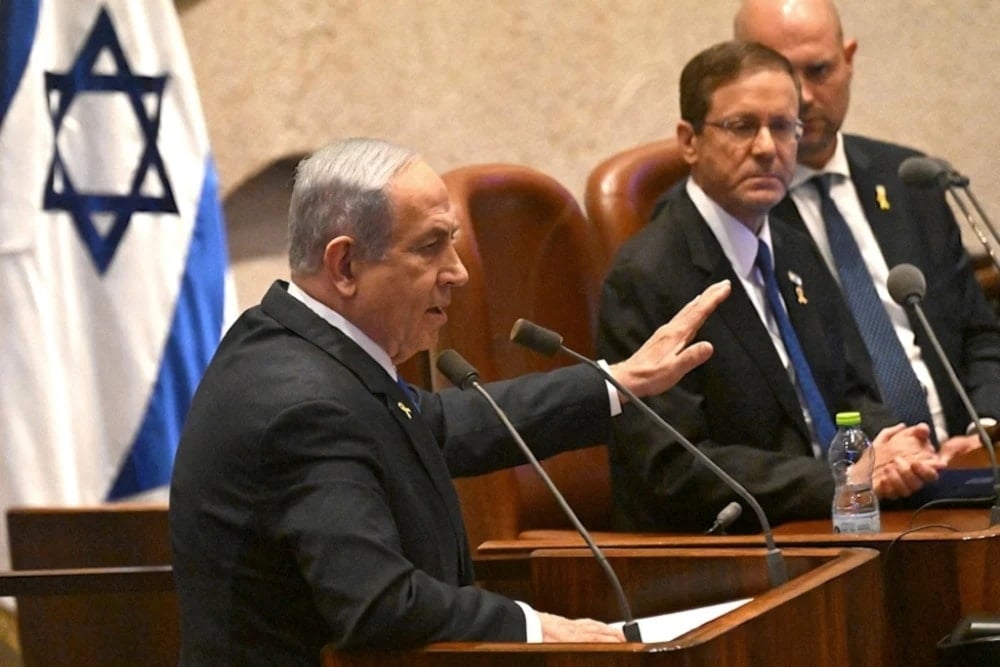Netanyahu demands investigation as security leak scandal intensifies
The leaks, which involve sensitive "state secrets", have sparked a growing scandal, with officials from Netanyahu's own office, including his security spokesperson, coming under scrutiny.
-

Israeli Prime Minister Benjamin Netanyahu speaks at the opening of the 25th Knesset session, in occupied al-Quds, Monday, October 28, 2024.(AP)
Israeli Prime Minister Benjamin Netanyahu has called for an urgent investigation into a series of security leaks involving "state secrets" since the start of the war on Gaza, which have sparked a growing scandal, implicating officials within the premier's office, including his security spokesperson.
In a post on the social media platform X, Netanyahu shared a copy of his formal request to Attorney General Gali Baharav-Miara, calling for an immediate probe. “Since the beginning of the war, we’ve witnessed a flood of serious leaks, disclosing state secrets,” he wrote, though he did not specify details related to his office.
He outlined that these leaks originated from high-level security discussions, including Cabinet meetings, deliberations of the now-dissolved war council, meetings of the Prisoners and Missing Persons Directorate, and other security forums.
In his letter to Baharav-Miara, Netanyahu expressed frustration over the lack of action on his repeated requests to investigate the leaks, noting that Shin Bet chief Ronen Bar had recently advised him to submit a formal request for an investigation.
Netanyahu urged Baharav-Miara to “immediately order an investigation into the leaks, especially the serious leaks I have outlined in detail in the attached addendum.”
Netanyahu’s letter was accompanied by a classified appendix highlighting key examples of the damaging leaks, the Yedioth Ahronoth newspaper mentioned.
According to the Kan public broadcaster, an insider familiar with the investigation revealed that the leaked documents compromised operations aimed at retrieving Israeli captives, putting the lives of soldiers at risk.
Yedioth Ahronoth's web portal, Ynet, stated that four individuals arrested in connection with this breach had served in a covert unit tasked with preventing leaks and "safeguarding state secrets." Among the detainees is a reserve officer with the rank of major, as well as Eli Feldstein, the spokesperson for Netanyahu's office.
Dive deeper
On Saturday, the Israeli Channel 13 broke news of the case, indicating that Netanyahu's office staff were suspected of leaking sensitive documents related to security and political affairs. Israeli judiciary sources confirmed that an investigation was initiated into the leaks, which potentially compromised "Israel's" wartime plans.
While several suspects have been detained for questioning, Netanyahu denied that any of his aides had been arrested, as reported by The Times of Israel.
Last week saw the start of a joint investigation by Shin Bet, police, and the military into suspected breaches of "national security" due to illegal information leaks, Israeli media reported.
The report also indicated that suspects selectively leaked and distorted documents obtained by Israeli forces on Hamas' prisoner negotiation strategies. These leaks led to articles in the German newspaper Bild and the British The Jewish Chronicle, which highlighted Hamas' approach—a strategy closely resembling statements made by Netanyahu in prior interviews and press briefings.
The Jewish Chronicle later withdrew a series of articles based on the documents and ended its collaboration with the author amid significant concerns about the authenticity of his reporting.
The Israeli military claimed the document cited by Bild was discovered in Gaza months prior and was not authored by martyred Hamas leader Yahya Sinwar but rather appeared to be a strategic paper drawn up by a mid-level Hamas official.
Mounting criticism
Israeli opposition leader Yair Lapid said Sunday that Netanyahu's actions throughout the recent leak indicate he is either too incompetent to lead during wartime or is "complicit in one of the most serious security offenses."
Lapid declared in a press conference with Benny Gantz immediately after the Rishon Letzion Magistrates Court removed a gag order on naming Eliezer Feldstein, the main suspect in an alleged leak, that “Netanyahu’s defense is that he has no influence or control over the system he heads. If that’s true, he’s ineligible. He is not qualified to lead the State of Israel in the most difficult war in its history."
"This case came out of the prime minister’s office, and the investigation should check if it was not on the prime minister’s orders. If Netanyahu knew, he is complicit in one of the most serious security offenses in the law book,” Lapid stated.
Israeli media have indicated that investigators are examining four distinct aspects of the case: the leak of classified documents, granting an advisor without security clearance access to restricted meetings and offices, mishandling of classified materials, and utilizing these documents to sway public opinion regarding a captives agreement.

 5 Min Read
5 Min Read








